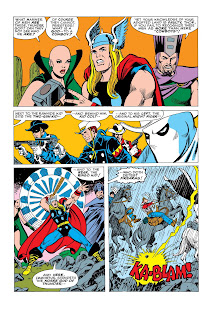When Hawkeye goes missing, Thor and new
Avenger Moondragon must travel into the past in order to recover their
arrow-slinging ally. There, they must confront the villainous Kang as he schemes
yet again to conquer Earth. Back in the present, the remaining Avengers duke it
out with the Squadron Supreme after uncovering a plot by the corrupt Roxxon Oil
Corporation.
Avengers:
The Serpent Crown collects Avengers #141-144
and #147-149, written by Steve Englehart and illustrated by George Perez.
With the superstar talent of Englehart
and Perez behind it, The Serpent Crown stands
as one of the most notable collection of stories from the early Bronze Age
Avengers. Set during the Beast’s probationary period with the Earth’s Mightiest
Heroes, this trade collects two concurrent storylines involving the Avengers’
conflicts with Kang the Conqueror and the Squadron Supreme (AKA Marvel’s “tribute”
to the Justice League). It’s a tightly written, dynamically drawn seven issue
arc that is packed with character development and incredible action. Englehart’s
scripting sets the tone by creating an electric chemistry between the
characters and sticking to a set theme of corporate corruption, while Perez’s
pencil work fills each panel with expressiveness to match.
There are a lot of developments in The
Serpent Crown, which is perhaps what has marked it for collection purposes
above many other story arcs for the Avengers from the 1970s. Notably – Captain
America re-joins the team after a lengthy leave of absence, Hawkeye departs
from the Avengers to pursue a (mostly) solo career out west, and Patsy Walker
makes her debut as the superheroine Hellcat. As mentioned previously, it’s also
set during the Beast’s early days adventuring with the Avengers, which itself
is important as it’s shortly after he turned his iconic blue hue. In fact, it
is the interplay between Hellcat and Beast that makes this arc as interesting
as it is. The habitually bickering duo is at odds with one another, which adds
a layer of humour to their dynamic. Beyond all of that, Englehart and Perez
seem to be setting new precedents for the portrayal of women in comic books.
Aside from a questionable line in which
Hellcat declares that she’s no “women’s libber,” The Serpent Crown seems to be concerned with the pursuit and
control of power when wielded by women. Newcomer Moondragon is unashamed and
confident in her incredible psychic gifts. She employs them with a mastery that
was often unseen amongst female characters in comic books. In fact, she seems
to consider herself an equal to Thor and even questions why he (and by
extension her) is “slumming” it with the mortal Avengers. Similarly, Scarlet
Witch is seen embracing her status as a true witch and her power set seems to
have grown exponentially as a result of this. A key scene in this collection
involves Wanda becoming the caretaker for the Serpent Crown and must use her
formidable willpower to free herself from its evil influence. Though Vision
tries to intervene and “rescue” her, it’s clear that Wanda needs no one but
herself to save the day. It’s an internal battle that is portrayed earnestly
through Perez’s art and is a moment that is not to be overlooked, though it
might be easy to do so given the incredible physical feats accomplished by the
men in this book.
As much as we see Moondragon and Scarlet
Witch embracing their fierceness, the slightly dippy Patsy Walker still has a
ways to go. In fact, The Serpent Crown is
very much her story and focuses on her rapid maturation from silly romance
heroine to sassy superheroine. Much is made early on about how burdensome Patsy
is as she accompanies the Avengers, with some members laying blame on her for
their predicament when they are captured by the Squadron Supreme (namely,
Vision). Through flashbacks, we see that Patsy lived a relatively unfulfilling
life in a small town and that her marriage was disastrous. We learn that she’s
always dreamed of being a hero and that she’ll do anything it takes to be one.
By the time she finally dons the Cat costume, she’s adamant about dedicating her
life to heroism. It’s admirable and her spunk is infectious, though the disdain
from her male cohorts (and concern – on Captain America’s part) looms heavily
over her. Thankfully, she does appear to prove herself and she’s shown to be
quite fearsome in battle (though it’s implied that the suit may be doing most
of the work for her).
The
Serpent Crown is an enjoyable – albeit dated – read. Englehart and Perez
make for a great team, one which suits the tone and aesthetic of the Avengers.
As with his previous work on the title, Englehart always adds an angle of
social relevance to the book and taps into themes that can be related to even
today. His dialogue is satisfactory, though verbose at times, and he has a good
grasp on the characters involved. I’m also rather impressed by how he handles
the many women present in this collection. It also goes without saying that
Perez’s pencils are gorgeous to look at. Given that this represents some of his
earlier work, the art is not quite as defined or detailed as it would be later
in New Teen Titans or Wonder Woman. There are minor issues
with proportions and perspective every now and then. If anything, The Serpent Crown represents a strong
showing from an era oft forgotten by comic book fans. Plus – it’s got Hellcat
and Moondragon in key roles!
RATING:
B







No comments:
Post a Comment